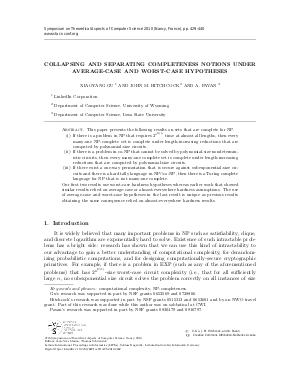Collapsing and Separating Completeness Notions under Average-Case and Worst-Case Hypotheses
Authors Xiaoyang Gu, John M. Hitchcock, Aduri Pavan
-
Part of:
Volume:
27th International Symposium on Theoretical Aspects of Computer Science (STACS 2010)
Part of: Series: Leibniz International Proceedings in Informatics (LIPIcs)
Part of: Conference: Symposium on Theoretical Aspects of Computer Science (STACS) - License:
 Creative Commons Attribution-NoDerivs 3.0 Unported license
Creative Commons Attribution-NoDerivs 3.0 Unported license
- Publication Date: 2010-03-09
File

PDF
LIPIcs.STACS.2010.2462.pdf
- Filesize: 301 kB
- 12 pages
Document Identifiers
Subject Classification
Keywords
- Computational complexity
- NP-completeness
Metrics
- Access Statistics
-
Total Accesses (updated on a weekly basis)
0Document
0Metadata
Abstract
This paper presents the following results on sets that are complete for $\NP$.
\begin{enumerate}
\item If there is a problem in $\NP$ that requires $\twonO$ time at almost all lengths, then every many-one NP-complete set is complete under length-increasing reductions that are computed by polynomial-size circuits.
\item If there is a problem in $\CoNP$ that cannot be solved by polynomial-size nondeterministic circuits, then every many-one complete set is complete under length-increasing reductions that are computed by polynomial-size circuits.
\item If there exist a one-way permutation that is secure against subexponential-size circuits and there is a hard tally language in $\NP \cap \CoNP$, then there is a Turing complete language for $\NP$
that is not many-one complete.
\end{enumerate}
Our first two results use worst-case hardness hypotheses whereas
earlier work that showed similar results relied on average-case or
almost-everywhere hardness assumptions. The use of average-case and
worst-case hypotheses in the last result is unique as previous results
obtaining the same consequence relied on almost-everywhere hardness
results.
Cite As Get BibTex
Xiaoyang Gu, John M. Hitchcock, and Aduri Pavan. Collapsing and Separating Completeness Notions under Average-Case and Worst-Case Hypotheses. In 27th International Symposium on Theoretical Aspects of Computer Science. Leibniz International Proceedings in Informatics (LIPIcs), Volume 5, pp. 429-440, Schloss Dagstuhl – Leibniz-Zentrum für Informatik (2010)
https://doi.org/10.4230/LIPIcs.STACS.2010.2462
BibTex
@InProceedings{gu_et_al:LIPIcs.STACS.2010.2462,
author = {Gu, Xiaoyang and Hitchcock, John M. and Pavan, Aduri},
title = {{Collapsing and Separating Completeness Notions under Average-Case and Worst-Case Hypotheses}},
booktitle = {27th International Symposium on Theoretical Aspects of Computer Science},
pages = {429--440},
series = {Leibniz International Proceedings in Informatics (LIPIcs)},
ISBN = {978-3-939897-16-3},
ISSN = {1868-8969},
year = {2010},
volume = {5},
editor = {Marion, Jean-Yves and Schwentick, Thomas},
publisher = {Schloss Dagstuhl -- Leibniz-Zentrum f{\"u}r Informatik},
address = {Dagstuhl, Germany},
URL = {https://drops.dagstuhl.de/entities/document/10.4230/LIPIcs.STACS.2010.2462},
URN = {urn:nbn:de:0030-drops-24627},
doi = {10.4230/LIPIcs.STACS.2010.2462},
annote = {Keywords: Computational complexity, NP-completeness}
}
